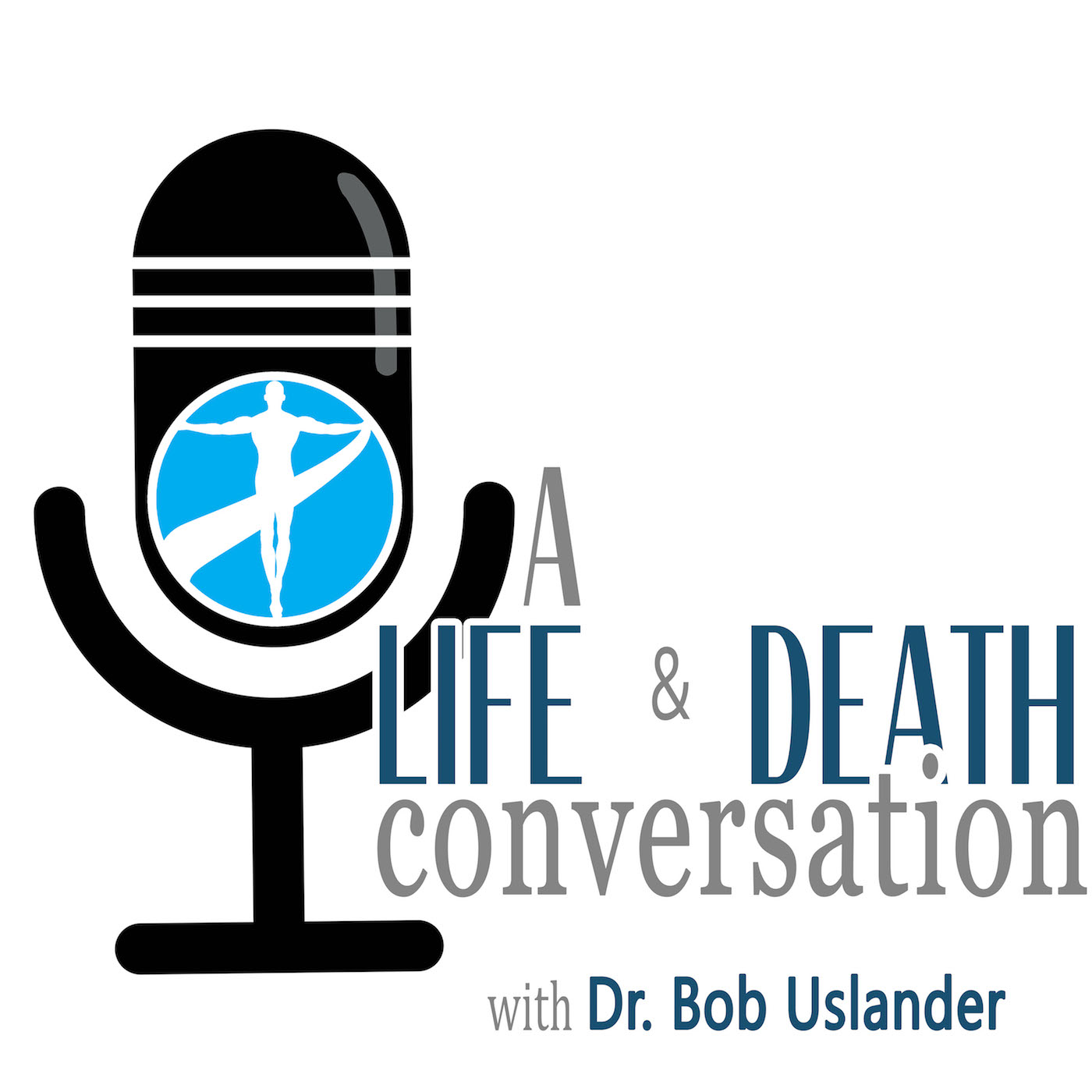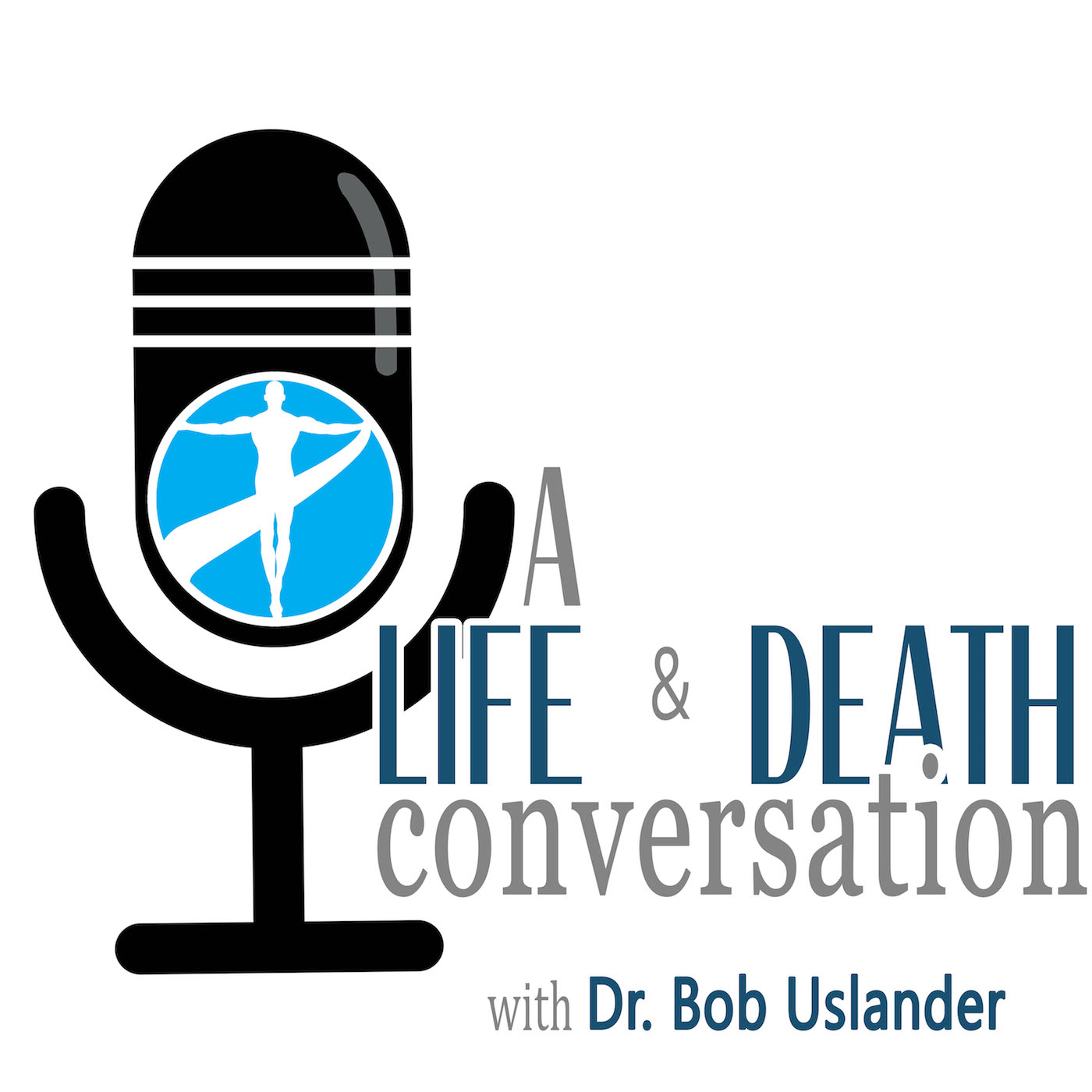A Life and Death Conversation, Dr. Bob Uslander Ep. 1
Description
Dr.Bob Uslander: Just me. I will be having guests and bring a number of fascinating, interested, and dedicated people onto this show to share their wisdom and expertise. I thought I would take this first show as an opportunity to introduce myself and give you a bit more of an understanding of why I feel this topic and this conversation is so vitally important.
Every day in the course of my work, I have life and death conversations. I talk with people about how to make their life better, more comfortable, more supported and, frankly, more enjoyable. I also talk with people about how to make their death better. When people are no longer able to find comfort, or joy, or meaning in their lives because they're old or they're sick, the only thing that they really look forward to at that point is their death and it's amazing to me when somebody is willing to sit with them and talk about that in a comfortable way, in a way that doesn't make them feel judged or make them feel afraid. They open up. They are so grateful to have that kind of honest conversation and connection.
I've been a physician now for close to 30 years and I've had so many conversations. Initially, I was very uncomfortable with the whole concept of death. When I first finished medical school and began my training and then my work as an ER physician, I had a lot of encounters with death. But, for the beginning of the early part of my career, death was always the enemy. When somebody died, it was a failure and we tried to avoid that at all costs. As I've gotten older, hopefully, a little wiser, and I've had more experiences, personal experiences, as well as experiences in my career, I've come to understand the concept of death and how death fits in a much deeper way. I no longer feel that it's the enemy. I actually feel a close kinship, a friendship with death. That's what I want this conversation to do for others, to help you and everybody learn how to feel like death is not your enemy but your friend.
This is delicate stuff. I get that. It's very important stuff. I believe that as a society we need to become more comfortable with the concept of death. We need to understand how our idea of death influences our life day-to-day because death is as much a part of life as birth. They're two sides of the same coin.
We have no trouble talking about birth. Will it be a natural birth or will it happen in the hospital? Will it be quick? Will it go on for hours or days? Who will be in the delivery room? It's a very natural thing for people to excitedly discuss all the details of the birth of a child. We even have parties to celebrate the upcoming birth and that's great. I think that's the way it should be, but only a small number of people seem comfortable talking about death whether we're discussing our own death or the death of someone else. Most people do anything they can to avoid that conversation or they quickly change the subject when in a conversation.
This avoidance of talking about death leads to an amazing, incredible amount of unnecessary struggle. It leads to anxiety. It leads to regret. It leads to guilt that can last a lifetime for a person who experiences the death of a loved one or a friend. I want to repeat that because really that's the reason I'm having this conversation. Refusing to talk about death leads to an enormous amount of anxiety, struggle, regret, and guilt. Most of that is completely avoidable.
I believe the reason that I've been so successful in my new medical practice, which is in large part helping people to have a more dignified and peaceful end of life, is because I'm willing to talk about this. I'm willing to talk about death in a way that most physicians aren't. Unfortunately, most doctors are as uncomfortable and maybe even more uncomfortable talking about death than their patients. This really compounds the problem. One of my goals is to help you help everyone feel more comfortable talking about death because I'm convinced that's how we can achieve a better life.
I want you to be more comfortable so that you can figure out how to make sure that you or someone that you care about has the most comfortable and struggle-free death whenever that happens. I want you to have the tools you need so if you're supporting a loved one through the end of their life or you're approaching the end of your life, you don't end up having regret. If you are supporting a loved one, I don't want you to have regret and guilt about what you did or didn't do during that time. When you're right in the middle of that storm, that's not the time to be preparing. The time to do that is now while you have the opportunity.
Here's what we need to agree on. It's going to happen. You're going to die. I'm going to die. The people you love are going to die. Our pets are going to die. Try as we might, there is nothing that can change that. Every living creature that comes into existence will die someday, from the insect that lives less than 24 hours to the tallest and mightiest redwood tree that lives for centuries. Everything has its time and then it dies and you're no different. I'm no different. Your parents are no different. Even your children are no different.
The goal should not be to try and ignore or defy that principle, that fact of life. The goal should be to recognize and even to embrace the magnificence of this master plan or the random nature of things, whichever way you believe. But the goal is to live a life of meaning and joy and to feel gratitude for whatever time we have to share in this adventure that we call life.
There are two choices. You have two choices. You can refuse to think about death, refuse to plan for it, even live in fear of it or you can find a way to become friends with death, to embrace it, to prepare for it and to allow the awareness and acceptance of death to inspire you to live with more inspiration and even to comfort you. Again, death isn't the enemy. What I believe is the enemy is a life without joy, without a sense of control and without hope that things will get better.
I'd like to share how I view or feel about death. I don't know exactly how I came to this awareness but it's been helpful for me and comforting for me and perhaps it can be that for you as well. I see death like the same way that I feel about an old friend, a friend who I knew when I was very, very young, maybe four, five years old. I have these friendships from my earliest years that were very dear and I look back at those relationships with a lot of fondness. I feel there was a deep connection that was based on sharing joy. There was very little else.
I know that I haven't seen this person, this friend, for many, many years and I may not see that friend for many, many more years. But, I believe that someday in the future I will again. We will reunite. When we do, we'll have this immediate sense of connection, recognition, love, and comfort, and the time that has gone by, the decades that have gone by will be meaningless. We know each other in a way that transcends the knowledge of what happened day-to-day in your life. Those things don't matter. They're just the details.
I have this sense that death is like this old friend who's not thinking about me all the time, not necessarily looking forward to anything in particular. But one day we will meet again and we will know each other deeply. That's how I feel about death because before I was born, I was in a void and I was in the same space where I will be again after I die. There's a familiarity. We've been there already. We have nothing to fear.
Interestingly, my first exposure to death was pretty traumatic. I look back now and I think about that first real experience with the death of another person and that happened in my third year of medical school. I'll share that story because I think it's fairly poignant. Up until that time, the only person I had known who had died was my grandfather and an old aunt. I wasn't there when they died, and as a child, it impacted me, but I was somewhat removed from it. On the very first day of my third year of medical school, that's when we start doing our clinical rotations and I was on the internal medicine rotation in that very first day. The first two years we spend mostly in classrooms and auditoriums doing lectures and going into labs and dissecting cadavers and learning about germs and medications. We'd have a little bit of contact with patients just by practicing, taking histories and doing physicals but we really didn't take care of anybody.
That very first day after a long day of working on the medical ward, I was on call and it was my very first night being in the hospital and I was very excited, a little anxious. I didn't know what to expect. I was very excited. After dinner, I went to my call room and I cracked open my textbook. Then I got called to do a few things, draw some blood, go and manage a coupl







